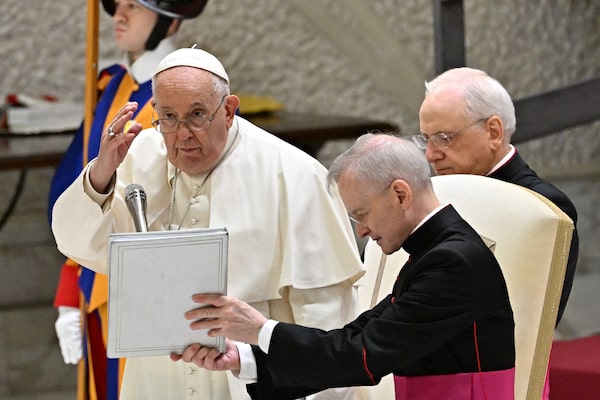
Pope Francis blesses the pilgrims during his weekly general audience in Paul-VI hall at the Vatican on Dec. 13.ANDREAS SOLARO/Getty Images
The Vatican’s announcement on Monday that Pope Francis has formally allowed priests to bless same-sex couples, although not in the context of marriage, is a small step toward the Catholic Church becoming more inclusive, but is a reminder that LGBTQ people are still fighting to be recognized as equal to others, advocates say.
“It’s a sad reminder that we’re still considered second-class citizens within the church,” said Helen Kennedy, executive director of the LGBTQ advocacy organization Egale Canada.
The Pope’s ruling reaffirms the church’s position that marriage is an indissoluble union between a man and a woman. It also includes several caveats to ensure blessings of same-sex couples do not occur in the context of anything resembling marriage, including that such blessings must be non-liturgical in nature, cannot take place during civil unions and cannot be conferred in settings with gestures or clothing associated with weddings.
Although the ruling says people in “irregular unions,” whether gay or straight, are in a state of sin, the fact that priests are now allowed to bless same-sex couples is “wonderful news,” said Frank Testin, president of Dignity Canada, an organization of Roman Catholics who promote what they call the “full personhood” of sexual minorities.
Pope Francis approves blessings for same-sex couples if the rituals don’t resemble marriage
“The institution is catching up to where the church members are,” Mr. Testin said. “I think it does reflect kind of the attitude of the feelings of of many Catholics. And the Catholic Church can change slowly. And again, maybe it’s more education that’s required. Maybe the hierarchy getting to know our relationships better may make a difference.”
In 2021, a controversial decree from the Vatican on the subject of blessing same-sex unions said “God cannot bless sin.”
The new ruling sets out to broaden the church’s view on blessings.
“Ultimately, a blessing offers people a means to increase their trust in God,” the document says. “The request for a blessing, thus, expresses and nurtures openness to the transcendence, mercy, and closeness to God in a thousand concrete circumstances of life, which is no small thing in the world in which we live.”
People seeking blessings “should not be required to have prior moral perfection,” it says.
“There is no intention to legitimize anything, but rather to open one’s life to God, to ask for his help to live better, and also to invoke the Holy Spirit so that the values of the Gospel may be lived with greater faithfulness,” it adds.
Mr. Testin said that many same-sex couples within the church “will be thrilled by the news,” despite the ruling’s caveats.
“I think the majority of LGBTQ-plus couples will seek blessing,” he said.
No custom component found for subtype: oovvuu-video
Reverend Deana Dudley, senior pastor at the Metropolitan Community Church of Toronto, a Protestant church with an LGBTQ-focused mission, praised the decision, which she called long overdue. But she said it still affirms a fundamental inequality.
“I think it’s about time. And I have mixed feelings about it. One, I’m pleased that they are taking incremental steps. I am not pleased that they still maintain the doctrinal position that same-sex relationships are, in their words, objectively disordered and sinful,” she said.
The Catholic Church moves “at a glacial pace,” she continued, and the new judgement is at the very least “a step forward.”
She also praised the Vatican’s recent decisions concerning transgender people.
Last month, the Vatican released a document saying that transgender people can be baptized within the church and can be baptismal sponsors (otherwise known as godparents), as well as witnesses at weddings.
That earlier decision, together with the latest on blessings, may lead to more widespread acceptance of LGBTQ people, Ms. Kennedy said.
“These are all little pockets of hope that hopefully will change some of the hearts and minds out there,” she said. “We’re a long way from full acceptance and equality.”
With a report from the Associated Press